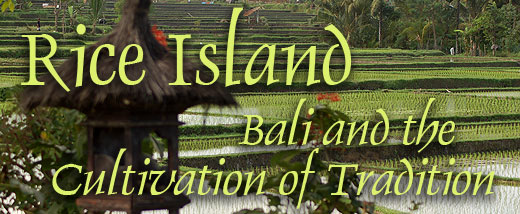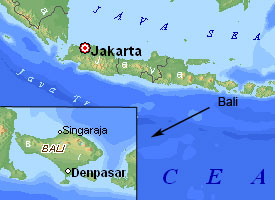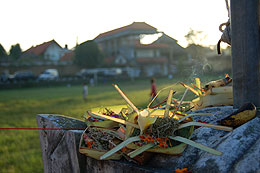|
 |
 |

by Colin Donohue [launch slideshow]
In 2002, I went to Bali, Indonesia, to attend an international meeting on sustainable development along with 6,000 other people from around the world. At the meeting—leading up to the World Summit on Sustainable Development—I represented a rural, non-profit development in the Appalachian region of the United States. Our goal was to increase income from sustainable forestry and agriculture. The Ford Foundation funded my attendance, as well as a hundred more “grassroots” innovators from around the world.
 While at the conference, I participated in a side trip to learn about traditional and modern Balinese agriculture. Bali has an advanced system of wet rice agriculture, involving local religions and traditions dating back a thousand years or more. In these traditions, rice is central. Each day, offerings of rice are given in thanks. Each family group has frequent ceremonies, which relate to rice and consequently create the social cohesion required for successful (and intensive) rice production. Each village also has larger though less frequent ceremonies. And annually, islanders gather for large festivals that are held at Kintamani and Lake Batur, which serves as the source of irrigation water for rice production across Bali. While at the conference, I participated in a side trip to learn about traditional and modern Balinese agriculture. Bali has an advanced system of wet rice agriculture, involving local religions and traditions dating back a thousand years or more. In these traditions, rice is central. Each day, offerings of rice are given in thanks. Each family group has frequent ceremonies, which relate to rice and consequently create the social cohesion required for successful (and intensive) rice production. Each village also has larger though less frequent ceremonies. And annually, islanders gather for large festivals that are held at Kintamani and Lake Batur, which serves as the source of irrigation water for rice production across Bali.
These ceremonial patterns reinforce the traditional Subak irrigation system—a complex, pulsed artificial ecosystem of rice paddies based around a water temple. Allocation of irrigation water is determined by the temple’s priest. The system not only provides environmental and agricultural stability, but also socioreligious consistency. The ceremonies reinforce the bonds between families, villages, and regions.
 Despite the intricate irrigation system, and the use of animals for wedding and other preparation activities, rice cultivation remains quite labor intensive. Additionally, rice farmers remain at a subsistence level. One farmer I met receives about $500 per year for three crops of rice—the equivalent of $1.50 per day to support his family. Despite the intricate irrigation system, and the use of animals for wedding and other preparation activities, rice cultivation remains quite labor intensive. Additionally, rice farmers remain at a subsistence level. One farmer I met receives about $500 per year for three crops of rice—the equivalent of $1.50 per day to support his family.
The slideshow that follows provide a glimpse of the traditional, rice-based Balinese life. The photographs were taken during a recent two-month fair trade research trip to the island.
View narrative slideshow of 16 photographs of rice cultivation and tradition in Bali >>
Please temporarily disable any popup window blockers to view slideshow.
Colin Donohue directs the National Network of Forest Practitioners and founded Bali Karma, which is dedicated to providing livelihoods in Bali and nearby islands of Indonesia through fair trade. Donohue lives in Athens, Ohio, and is an alum of Antioch College. |
|
 |
|

